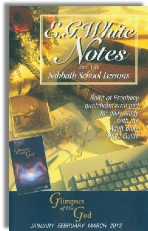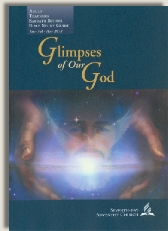|
||||||||||||||
Commentary on "The Triune God"
Day 1: Sabbath Afternoon, December 31, 2011 - Introduction
Overview
The first week's lesson this quarter attempts to describe the Seventh-day Adventist “Godhead.” It must be said at the outset that Adventism's teaching of “the Godhead” (which they sometimes refer to as “the Trinity”) is not the same doctrine as the historic, orthodox Christian doctrine of the Trinity. This fact has now even been admitted by many SDA scholars (some examples can be found here: http://www.cultorchristian.com/sdaadmissions.html). Thus, from a Christian perspective, Adventism, despite it's deceptive use of the word “Trinity,” is actually non-Trinitarian. As the week progresses, we will examine some of the differences between the Adventist Godhead and the Christian Trinity.
Observations
First of all, in both the Introduction to this quarter and the first day of Lesson 1, it is stated that “God” is “composed of three Persons” (or, as the Easy Reading Edition of the quarterly puts it: “made up of Three Persons”). This sort of language is typical in Adventism, because they do not believe in the orthodox concept of Divine simplicity, as we will also see tomorrow. God is not “composed” or “made up” of parts, but rather He is one single indivisible/simple (as opposed to composite/complex/aggregate) living Being. As the Wikipedia article on Divine simplicity puts it: “This doctrine also helps keep trinitarianism from drifting into tritheism, which is the belief in three different gods: the persons of God are not parts or essential differences, but are rather the way in which the one God exists personally.” (http://en.wikipedia.org/wiki/Divine_simplicity)
The author of this quarter's lessons certainly wastes no time in showing that Adventism teaches Tritheism (three divine beings/gods) rather than orthodox Trinitarianism. The first day's lesson states:
“The 'eternal heavenly dignitaries—God, and Christ, and the Holy Spirit,' as Ellen G. White calls them (Evangelism, p. 616), are equal but not identical or interchangeable.”
Not only does Ellen White use the tritheistic term “eternal heavenly dignitaries” but the author then uses the word “them” to refer to these “heavenly dignitaries.” And the Easy Reading Edition paraphrases Ellen White's statement in a clearly Tritheistic manner: “Ellen G. White calls the Godhead the 'eternal Rulers of heaven—God, Christ, and the Holy Spirit.'—Adapted from Evangelism, page 616. They are equal but not the same.” Notice also that “the Godhead” is being defined as a “they/them” (i.e., a group or committee of three gods).
Additionally, in the accompanying Study Helps, immediately before and after the Ellen White quote above, are the following two quotes:
“When they [Israel] came to Sinai, He took occasion to refresh their minds in regard to His requirements. Christ and the Father, standing side by side upon the mount, with solemn majesty proclaimed the Ten Commandments.—Historical Sketches, p. 231. (1866). {Ev 616.3}”
“We need to realize that the Holy Spirit, who is as much a person as God is a person, is walking through these grounds.—Manuscript 66, 1899 (From a talk to the students at the Avondale School.). {Ev 616.5}”
Both of these quotes illustrate the Adventist denial of God's incorporeal nature—that He is spirit and does not by nature have a body. Not only did Ellen White teach that the Father has a body (and that the Son had his own separate body before the incarnation), but the second quote above (when compared to other quotes of hers about the Father and as admitted by SDA scholars—see here: http://www.cultorchristian.com/#Incorporeality) also teaches that the Holy Spirit has a body. This teaching of divine corporeality also necessitates their belief in polytheism (multiple divine beings). Thus, Adventism has three separate physical divine beings, who are united as a group (called “the Godhead”). This concept is diametrically opposed to the orthodox Christian teaching that God is one divine spirit being without body or parts. Jesus says in John 4:24 that "God is spirit." And in Luke 24:39, He says, "a spirit does not have flesh and bones."
Even this quarter's cover art illustrates this heretical understanding of three corporeal beings, with a picture of the Adventist “Jesus” and “Holy Spirit” (dove) surrounded by the physical arms and hands of “the Father.” (It may also be worth noting that those hands are larger than the head of “Jesus.”)
The “Key Thought” for this first week's lesson states: “Scripture contains references and hints to the deity and unity of the divine Godhead.”
Again we see their misusage of the word “Godhead.” If they were using the word in its Biblical sense (translated in the old King James Version on three occasions from three different Greek words which simply mean, “divine,” “divine nature,” and “deity”), then the sentence would not make any sense whatsoever. They would simply be saying “the deity...of the divine deity” or “the deity...of the divine divine,” which would be utter nonsense.
The final paragraph for the first day's lesson says:
“Though some early Adventists struggled with the doctrine, our church today has taken a firm and unrelenting stand on this teaching. As Fundamental Belief number 2 says, 'There is one God: Father, Son, and Holy Spirit, a unity of three co-eternal Persons.'”
It is dishonest for the author to claim that only “some” early Adventists merely “struggled with the doctrine” of the Trinity. The truth is that the early SDA Church as a whole was united both in its strong and unambiguous opposition to the orthodox Christian doctrine of the Trinity (and even to the current SDA heresy of Tritheism) and also in its adherence to some form of Arianism: denying the eternality of Jesus Christ, denying the personality of the Holy Spirit, and teaching bitheism, or two gods, the eternal Father and the non-eternal Son. The second half of the first sentence quoted above, however, is true. The SDA Church today has indeed taken a firm and unrelenting stand on the doctrine of the Trinity: they oppose the orthodox Christian doctrine of the Trinity and have taken a firm and unrelenting position of anti-Trinitarian Tritheism in its place. This is only affirmed, not refuted, by the quote from Fundamental Belief number 2, which defines “one God” as “a unity [group] of three.” That this is what is meant by their Fundamental Belief statement is made clear in, among other resources, this lesson's corresponding paraphrase in the Easy Reading Edition, which says: “As Fundamental (Basic) Belief number 2 says, 'There is one God: Father, Son, and Holy Spirit, a unity (joined together as one) of Three co-eternal Persons.'” (Parentheses in original.) Notice that they define the word unity as “joined together as one.” This definition makes the statement grammatically incorrect, but it is obvious that they are defining “one God” as “a [group] of Three...joined together as one.” That is Tritheism, not Trinitarianism.
Summary
- God is not “composed” of parts, but rather He is one single indivisible living spirit Being.
- Adventism actually teaches Tritheism (three divine beings/gods) rather than the Trinity. The Adventists say that “the Godhead” is a group of three “eternal heavenly dignitaries” in opposition to the Christian doctrine of the Trinity, which says that there is one living divine Being who exists as three distinct, but not separate, persons.
- Adventism denies that God is spirit and is thus incorporeal/immaterial in nature, instead teaching that there are three separate corporeal (physical/material) divine beings (gods).
- The Seventh-day Adventist Church's “Fundamental Beliefs” statement actually teaches Tritheism rather than Trinitarianism.
Copyright 2011 BibleStudiesForAdventists.com. All rights reserved. Revised December 29, 2011. This website is published by Life Assurance Ministries, Glendale, Arizona, USA, the publisher of Proclamation! Magazine. Contact email: BibleStudiesForAdventists@gmail.com.
The Sabbath School Bible Study Guide and the corresponding E.G. White Notes are published by Pacific Press Publishing Association, which is owned and operated by the Seventh-day Adventist church. The current quarter's editions are pictured above.
Official Adventist Resources
Standard Edition Study Guide Week 1
Teacher's Edition Study Guide Week 1
Easy Reading Edition Study Guide Wk 1
Search the Complete Published Ellen G. White Writings
Please Support This Project


